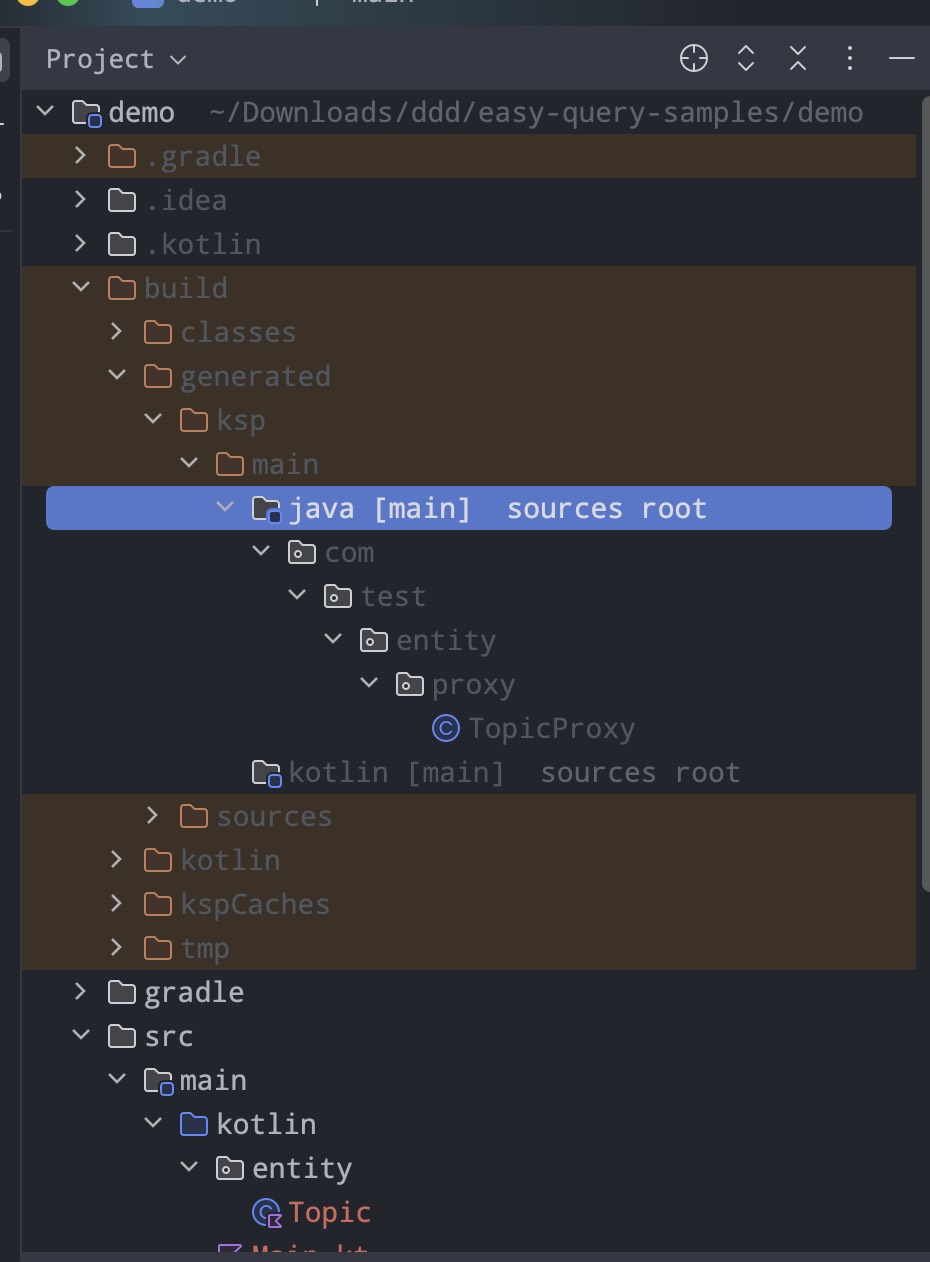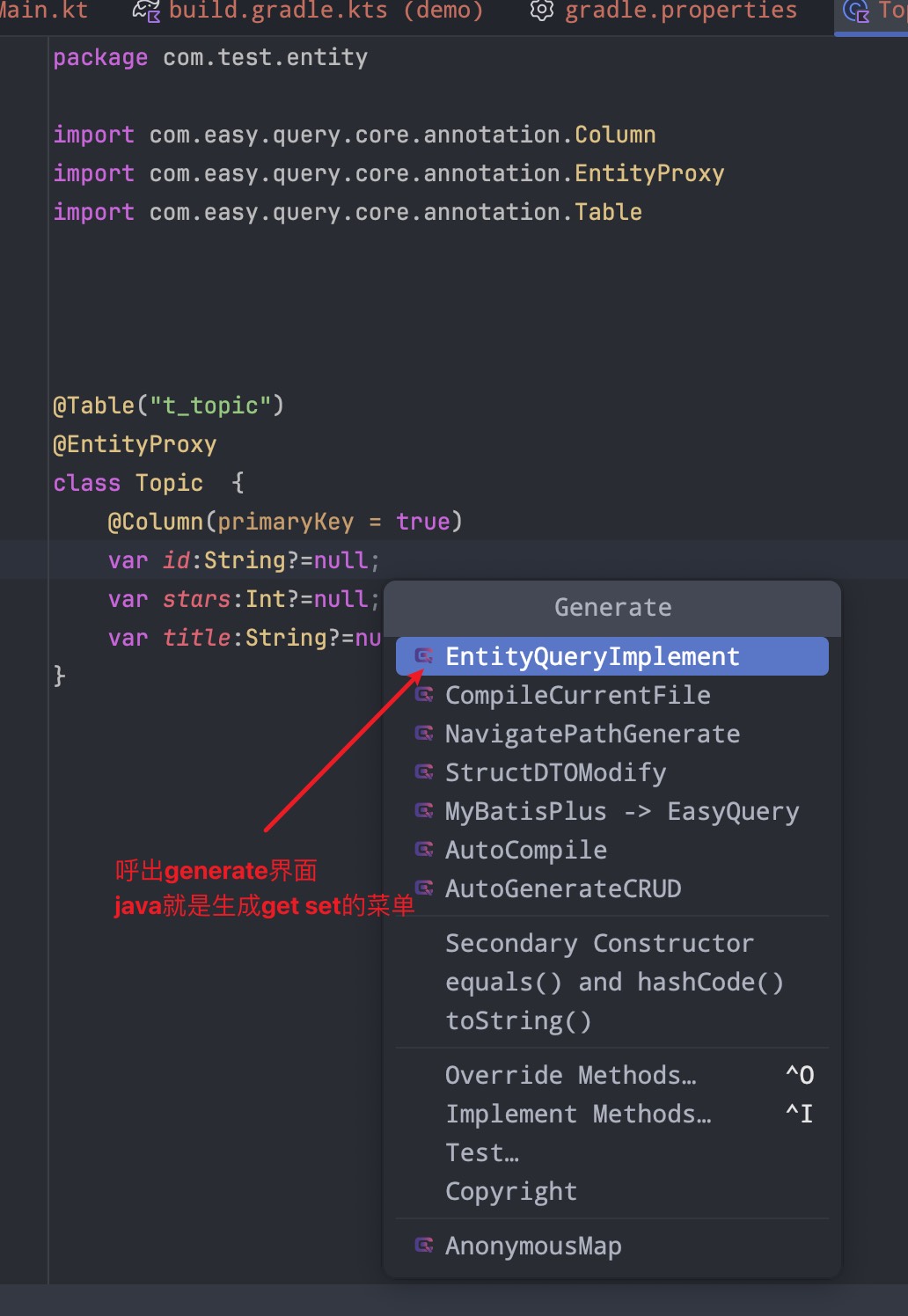Kotlin KSP Configuration
10/27/25About 2 min
Kotlin Configuration
eq not only supports Java but also supports the use of kotlin language. We will use KSP to implement Kotlin-related processing
The source code for this chapter is available on Git. Please obtain it yourself if needed Click to get it
Creating a Kotlin Project
Adding Dependencies
build.gradle file
plugins {
kotlin("jvm") version "1.9.21"
id("com.google.devtools.ksp") version "1.9.21-1.0.15"
}
group = "com.test"
version = "1.0-SNAPSHOT"
repositories {
mavenCentral()
}
dependencies {
implementation(kotlin("stdlib"))
implementation("com.easy-query:sql-core:3.0.41")
implementation("com.easy-query:sql-mysql:3.0.41")
implementation("com.easy-query:sql-api-proxy:3.0.41")
// annotationProcessor("com.easy-query:sql-processor:3.0.41")
ksp("com.easy-query:sql-ksp-processor:3.0.41")
implementation("com.mysql:mysql-connector-j:9.2.0")
implementation("com.zaxxer:HikariCP:3.3.1")
testImplementation(kotlin("test"))
}
tasks.test {
useJUnitPlatform()
}
kotlin {
jvmToolchain(17)
// Add generated code to the compilation path.
// Without this configuration, gradle commands can still execute normally,
// but Intellij cannot find the generated source code.
sourceSets.main {
kotlin.srcDir("build/generated/ksp/main/kotlin")
}
}Adding Database Objects
@Table("t_topic")
@EntityProxy
class Topic {
@Column(primaryKey = true)
var id:String?=null;
var stars:Int?=null;
var title:String?=null;
}Generating Proxy Objects
After building the current project, you can see the corresponding generated TopicProxy class in the build module

Quick Interface Implementation with Plugin
If you have the plugin installed, you can quickly implement the interface using the plugin, or you can implement it yourself

Final Topic Class
package com.test.entity
import com.easy.query.core.annotation.Column
import com.easy.query.core.annotation.EntityProxy
import com.easy.query.core.annotation.Table
import com.easy.query.core.proxy.ProxyEntityAvailable;
import com.test.entity.proxy.TopicProxy;
//Can also use data class
@Table("t_topic")
@EntityProxy
class Topic : ProxyEntityAvailable<Topic, TopicProxy> {
@Column(primaryKey = true)
var id:String?=null;
var stars:Int?=null;
var title:String?=null;
}Writing Test Code
package com.test
import com.easy.query.api.proxy.client.DefaultEasyEntityQuery
import com.easy.query.core.api.client.DefaultEasyQueryClient
import com.easy.query.core.bootstrapper.EasyQueryBootstrapper
import com.easy.query.core.logging.LogFactory
import com.easy.query.mysql.config.MySQLDatabaseConfiguration
import com.test.entity.Topic
import com.zaxxer.hikari.HikariDataSource
fun main() {
println("Hello World!")
var hikariDataSource = HikariDataSource()
hikariDataSource.jdbcUrl =
"jdbc:mysql://127.0.0.1:3306/easy-query-test?serverTimezone=GMT%2B8&characterEncoding=utf-8&useSSL=false&allowMultiQueries=true&rewriteBatchedStatements=true";
hikariDataSource.username = "root";
hikariDataSource.password = "root";
hikariDataSource.driverClassName = "com.mysql.cj.jdbc.Driver";
hikariDataSource.maximumPoolSize = 20;
LogFactory.useStdOutLogging();
var easyQueryClient = EasyQueryBootstrapper.defaultBuilderConfiguration()
.setDefaultDataSource(hikariDataSource)
.useDatabaseConfigure(MySQLDatabaseConfiguration())
.build()
var entityQuery = DefaultEasyEntityQuery(easyQueryClient)
var toList = easyQueryClient.queryable(Topic::class.java)
.toList()
var toList1 = entityQuery.queryable(Topic::class.java)
.where {
it.id().eq("123")
}.toList()
}Kotlin Infix Expressions
If you want to use infix for operator comparisons, upgrade eq to 3.1.43+ and the plugin to 0.1.67+, then implement a DSL infix operation yourself as follows
package com.test.entity
import com.easy.query.core.expression.parser.core.SQLTableOwner
import com.easy.query.core.proxy.SQLColumn
import com.easy.query.core.proxy.predicate.DSLColumnComparePredicate
import com.easy.query.core.proxy.predicate.DSLFunctionComparePredicate
import com.easy.query.core.proxy.predicate.DSLValuePredicate
import com.easy.query.core.proxy.predicate.aggregate.DSLSQLFunctionAvailable
infix fun <TProperty> DSLValuePredicate<TProperty>.eq(value: TProperty?) = this.eq(value)
infix fun <TProperty, TProxy, TProp> DSLColumnComparePredicate<TProperty>.eq(
column: SQLColumn<TProxy, TProp>,
) {
this.eq(column)
}
infix fun <TProperty, T> DSLFunctionComparePredicate<TProperty>.eq(column: T)
where T : SQLTableOwner, T : DSLSQLFunctionAvailable {
this.eq(column)
}This way the above expression can be written like this
var toList1 = entityQuery.queryable(Topic::class.java)
.where {
it.id eq "123"
}.toList()Contributors
只是我
